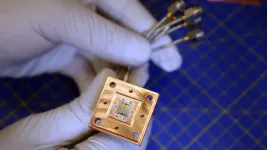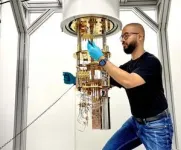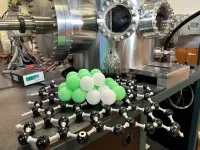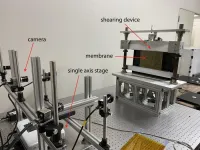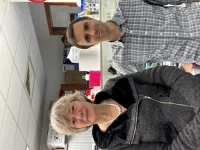(Press-News.org) Quantum computers require extreme cooling to perform reliable calculations. One of the challenges preventing quantum computers from entering society is the difficulty of freezing the qubits to temperatures close to absolute zero. Now, researchers at Chalmers University of Technology, Sweden, and the University of Maryland, USA, have engineered a new type of refrigerator that can autonomously cool superconducting qubits to record low temperatures, paving the way for more reliable quantum computation.
Quantum computers have the potential to revolutionise fundamental technologies in various sectors of society, with applications in medicine, energy, encryption, AI, and logistics. While the building blocks of a classical computer – bits – can take a value of either 0 or 1, the most common building blocks in quantum computers – qubits – can have a value of 0 and 1 simultaneously. The phenomenon is called superposition and is one of the reasons why a quantum computer can perform parallel computations, resulting in enormous computational potential. However, the time a quantum computer can work on a calculation is still significantly constrained, because it spends a lot of time correcting errors.
“Qubits, the building blocks of a quantum computer, are hypersensitive to their environment. Even extremely weak electromagnetic interference leaking into the computer could flip the value of the qubit randomly, causing errors – and subsequently hindering quantum computation,” says Aamir Ali, research specialist in quantum technology at Chalmers University of Technology.
Demonstrates record low temperatures
Today, many quantum computers are based on superconducting electrical circuits that have zero resistance and therefore preserve information very well. For qubits to work without errors and for longer periods in such a system, they need to be cooled to a temperature close to absolute zero, equivalent to minus 273.15 degrees Celsius or zero Kelvin, the scientific unit of temperature. The extreme cold puts the qubits into their lowest-energy state, the ground state, equivalent to value 0, a prerequisite for initiating a calculation.
The cooling systems used today, so-called dilution refrigerators, bring the qubits to about 50 millikelvin above absolute zero. The closer a system approaches to absolute zero, the more difficult further cooling is. In fact, according to the laws of thermodynamics, no finite process can cool any system to absolute zero. Now, the researchers at Chalmers University of Technology and University of Maryland have constructed a new type of quantum refrigerator that can complement the dilution refrigerator and autonomously cool superconducting qubits to record-low temperatures. The quantum refrigerator is described in an article in the journal Nature Physics.
“The quantum refrigerator is based on superconducting circuits and is powered by heat from the environment. It can cool the target qubit to 22 millikelvin, without external control. This paves the way for more reliable and error-free quantum computations that require less hardware overload,” says Aamir Ali, lead author of the study and continues:
“With this method, we were able to increase the qubit’s probability to be in the ground state before computation to 99.97 per cent, which is significantly better than what previous techniques could achieve, that is, between 99.8 and 99.92 per cent. This might seem like a small difference, but when performing multiple computations, it compounds into a major performance boost in the efficiency of quantum computers.”
Powered naturally by the environment
The refrigerator utilises interactions between different qubits, specifically between the target qubit to be cooled and two quantum bits used for cooling. Next to one of the qubits, a warm environment is engineered to serve as a hot thermal bath. The hot thermal bath gives energy to one of the quantum refrigerator’s superconducting qubits and powers the quantum refrigerator.
“Energy from the thermal environment, channeled through one of the quantum refrigerator’s two qubits, pumps heat from the target qubit into the quantum refrigerator’s second qubit, which is cold. That cold qubit is thermalised to a cold environment, into which the target qubit’s heat is ultimately dumped,” says Nicole Yunger Halpern, NIST Physicist and Adjunct Assistant Professor of Physics and IPST at the University of Maryland, USA.
The system is autonomous in that once it is started, it operates without external control and is powered by the heat that naturally arises from the temperature difference between two thermal baths.
“Our work is arguably the first demonstration of an autonomous quantum thermal machine executing a practically useful task. We originally intended this experiment as a proof of concept, so we were pleasantly surprised when we found out that the performance of the machine surpasses all existing reset protocols in cooling down the qubit to record-low temperatures,” says Simone Gasparinetti, Associate Professor at Chalmers University of Technology and lead author of the study.
More information about the study:
Read the study Thermally driven quantum refrigerator autonomously resets a superconducting qubit in the scientific journal Nature Physics.
The studied device was fabricated in Myfab, Chalmers University of Technology in Sweden, a nanofabrication laboratory.
The study has been carried out by Aamir Ali, Simone Gasparinetti, Claudia Castillo-Moreno and Paul Jamet Suria at the Department of Microtechnology and Nanoscience at Chalmers University of Technology, Sweden, and Nicole Yunger Halpern, José Antonio Marín Guzman and Jeffrey M. Epstein at the Joint Center for Quantum Information and Computer Science, NIST and the University of Maryland, USA, and the Institute for Physical Science and Technology at the University of Maryland, US.
The research received support from the Swedish Research Council, the Knut and Alice Wallenberg Foundation through the Wallenberg Center for Quantum Technology (WACQT), the European Union, Quantum Flagship project ASPECTS and ERC ESQuAT, the National Science Foundation and the John Templeton Foundation.
END
EMBARGO 9.1.2025
New discovery makes organic solar cells more efficient and stable
Researchers at Åbo Akademi University in Finland have identified and eliminated a previously unknown loss mechanism in organic solar cells that makes them more efficient and gives them a longer lifetime. The results provide new insight into how efficiency and stability can be increased in the future.
The work of the Organic Electronics Research Group at Åbo Akademi University was carried out in cooperation with Professor Chang-Qi Ma's group at Suzhou Institute ...
Fiber is well known to be an important part of a healthy diet, yet less than 10% of Americans eat the minimum recommended amount. A new study from Stanford Medicine might finally convince us to fill our plates with beans, nuts, cruciferous veggies, avocados and other fiber-rich foods. The research, which will be published in Nature Metabolism on Jan. 9 identified the direct epigenetic effects of two common byproducts of fiber digestion and found that some of the alterations in gene expression had anti-cancer actions.
When we eat fiber, the gut microbiome produces short-chain fatty ...
ORACLE test predicts overall cancer survival independent of currently used clinical risk factors, and it has the best predictive power in stage 1 lung cancer.
A high ORACLE score is associated with a higher risk of cancer spread.
ORACLE could potentially be used to pick out patients who would benefit most from chemotherapy.
Researchers at the Francis Crick Institute, the UCL Cancer Institute and UCLH have shown that a test called ORACLE can predict lung cancer survival at the point of diagnosis better than currently used clinical risk factors. This could help doctors make more informed treatment decisions for people with stage ...
UNDER EMBARGO UNTIL 10 AM GMT / 5 AM ET THURSDAY 9 JANUARY 2025
Pioneering new mathematical model could help protect privacy and ensure safer use of AI
AI tools are increasingly being used to track and monitor us both online and in-person, yet their effectiveness comes with big risks. Computer scientists at the Oxford Internet Institute, Imperial College London, and UCLouvain have developed a new mathematical model which could help people better understand the risks posed by AI and assist regulators in protecting peoples’ privacy. The findings have been published today (9 January) in Nature Communications.
For ...
Key takeaways
Hydroclimate whiplash – rapid swings between intensely wet and dangerously dry weather – has already increased globally due to climate change, with further large increases expected as warming continues, according to a team of researchers led by UCLA’s Daniel Swain.
The “expanding atmospheric sponge,” or the atmosphere’s ability to evaporate, absorb and release 7% more water for every degree Celsius the planet warms, is a key driver of the whiplash.
Co-management of extreme rainfall or extreme droughts, ...
Scientists have created a catalyst for hydrogen generation from ammonia that becomes more active with time, and by counting atoms revealed changes that boost the catalyst’s performance.
A research team from the University of Nottingham's School of Chemistry, in collaboration with the University of Birmingham and Cardiff University, has developed a novel material consisting of nanosized ruthenium (Ru) clusters anchored on graphitized carbon. These Ru nanoclusters react with ammonia molecules, catalysing splitting ammonia into ...
Exiting Earth’s gravity takes an enormous amount of fuel and power. Due to this, spacecraft strapped to rockets are limited in their carry capacity and every gram must be accounted for. To lighten the load, thin membranes are being researched as alternative materials, but their plastic wrap property causes wrinkling that can affect operational performance. For this reason, there is a need to develop measurement technology that can accurately detect deformations.
Professor Takashi Iwasa at Osaka Metropolitan University’s Graduate School of Engineering led a team in developing a method for measuring the size of wrinkles ...
Women are less likely to receive a lung transplant and spend an average of six weeks longer on the waiting list, according to a study published today (Thursday) in ERJ Open Research [1]. However, women who receive a lung transplant are more likely than men to live for five years post-transplant. Based on their findings, the researchers encourage changes in regulation and clinical guidelines to address this inequality.
Lung transplantation is the only treatment for people with end-stage respiratory failure and patients on the waiting list have a high risk ...
The average life expectancy of people diagnosed with dementia ranges from 9 years at age 60 to 4.5 years at age 85 for women and from 6.5 to just over 2 years, respectively, in men, finds a systematic review of the latest evidence in The BMJ today.
The results also suggest that one third of people with dementia are admitted to a nursing home within three years of diagnosis.
Nearly 10 million people worldwide receive a diagnosis of dementia every year, but survival estimates vary widely, and few ...
UK supermarket giant Tesco is being urged to drop an “unethical” pilot of an in-store infant feeding advice service in which Danone-funded midwives are expected to wear branded uniforms and undergo training by the formula company, reveals an exclusive news report published by The BMJ today.
Critics say that the initiative, running in Tesco’s flagship store and set to be rolled out shortly, is a backward step and reminiscent of the “milk nurses” scandal of the 1970s, where formula industry salespeople dressed as nurses and promoted formula milk to parents.
One midwife hired by Danone quit ...
